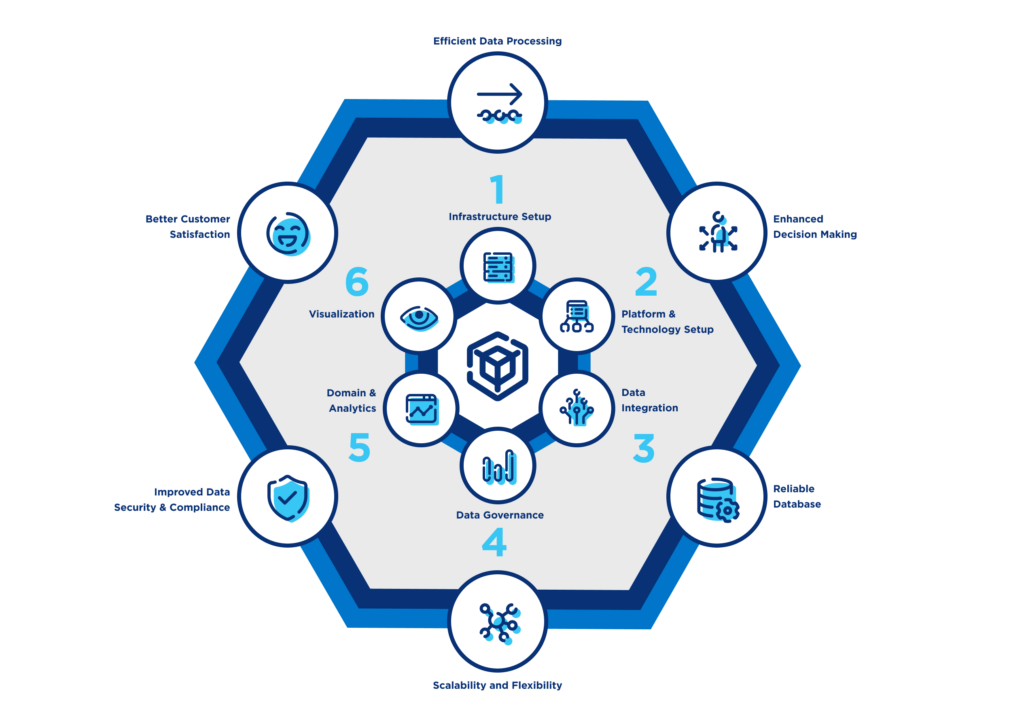Transform your enterprise with Data Modernisation
Leverage Lumen expertise to architect data infrastructure and DataOps that strengthens governance and supports future-focused AI initiatives, advanced analytics and intelligent insights.
Why your business needs Data Modernisation
Legacy data management limits cloud adoption, technology innovation and business growth. Modernise your data systems to build advanced data applications, address existing data processing complexities and reduce time-to-insights.

Integrate diverse systems
Unlock data flows that support application integration and business process automation. Allow seamless information sharing across the enterprise to drive productivity, efficiency and real-time analytics.

Optimise data processing
Significantly enhance the scale and speed of your data analytics initiatives while reducing cost and complexities. Make your data more accessible, reliable and secure even as you broaden its utilisation to solve new challenges.

Boost data governance
Minimise risks and consequences that come from data leaks and security breaches.
Establish strong data security policies and implement them throughout your data lifecycle with a range of managed data protection services.

Monetise existing data
Convert your data into new revenue streams by offering data-as-a-service and insights-as-a-service through secure API development. We can help you transform data collections into assets for research, development and marketing.
Reimagine your data, reshape your business
Moving data workloads to the cloud is just the first step. Lumen experts provide future-focused strategy and technical support to help you reinvent your processes and maximise data utilisation.

Learn more about Lumen Data Modernisation
What are Lumen Data Modernisation services?
Lumen Data Modernisation services provide strategic guidance and redevelopment support for all your data projects. Our Analyse-Visualise-Monetise services include:
- End-to-end data governance and management.
- Data discovery and transformation into new workflows and applications.
- Data visualisation for faster and more informed decision-making.
- BigData services like data source integration, real-time analytics and moving big data workloads to the cloud.
- AI/ML for your data and with your data.
Upgrade your data infrastructure, adopt serverless data management or seamlessly migrate data workloads between public, hybrid and edge cloud environments. We analyse your requirements and suggest a solution that aligns with your business goals.
How does Lumen Data Modernisation work?
Your Lumen data modernisation journey begins with thoroughly assessing your existing infrastructure, code and tech stack. We meet all relevant stakeholders to understand business requirements, future vision and end-user expectations. Our team then provides strategic guidance to harness the full power of your data while meeting all regulatory, quality and cost requirements.
Next, we begin implementation and deployment. We follow agile practices like continuous integration/continuous delivery and short release cycles for early feedback and enhanced quality assurance. We aim to get your data working for you in the shortest possible time and within budget.
Data Modernisation FAQs
What is data modernisation?
Data modernisation is the process of updating an organisation’s data strategy, tools and applications to align with current technological capabilities and business needs. This means moving away from legacy systems to more advanced, scalable and contemporary data architectures. Critical aspects of data modernisation include:
- Migrating data storage and processing from on-premises systems to cloud platforms.
- Transitioning from monolithic database systems to more flexible structures that can handle all types of data.
- Leveraging modern analytical tools to gain deeper insights from data.
- Adopting solutions that can handle increasing data volumes and complexities without significant additional costs.
The goal of data modernisation is not just to update technology but to ensure that you can use data as a strategic asset.
What are the benefits of data modernisation?
Data modernisation enables organisations to improve operational efficiencies. It provides faster data processing capabilities for real-time analytics at lower cost and complexity. Organisations can also implement advanced security features to protect sensitive information from breaches and ensure compliance with data protection regulations.
More importantly, data modernisation ensures organisations are well-prepared to integrate newer technologies and methodologies as they emerge. Organisations can completely transform the way they operate, make decisions and deliver value to their stakeholders.
What is the difference between data modernisation and data migration?
Data migration refers to the act of transferring data from one system, format, or application to another. For example, you may move your data from an on-prem system to a public cloud storage service.
Data migration is just one component of data modernisation. It focuses solely on moving and reformatting data between environments so it remains accurate and accessible. In contrast, data modernisation is a much broader effort with the potential to transform how an organisation uses and manages its data.
Questions? Let’s talk.
Contact our team and get answers you’re looking for.


